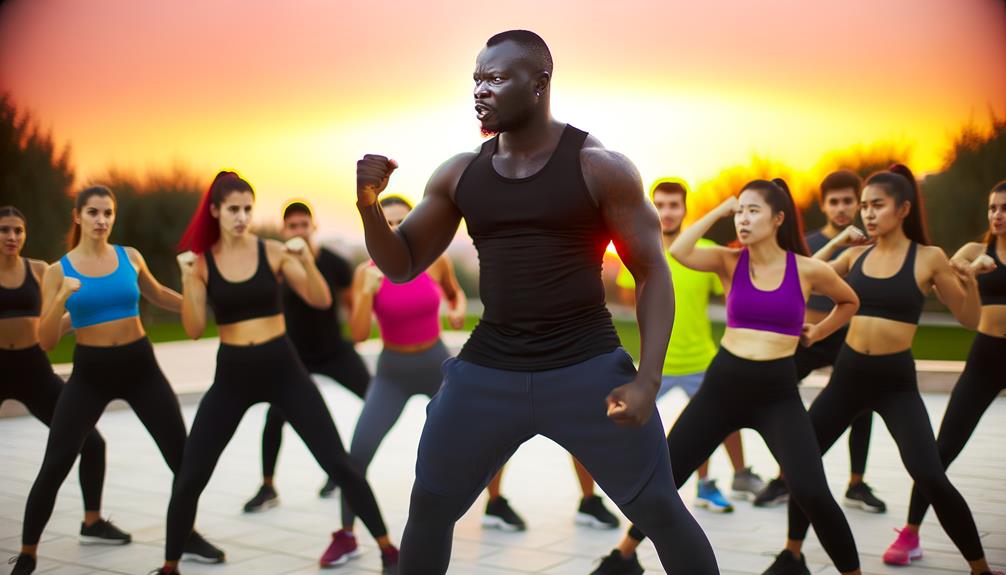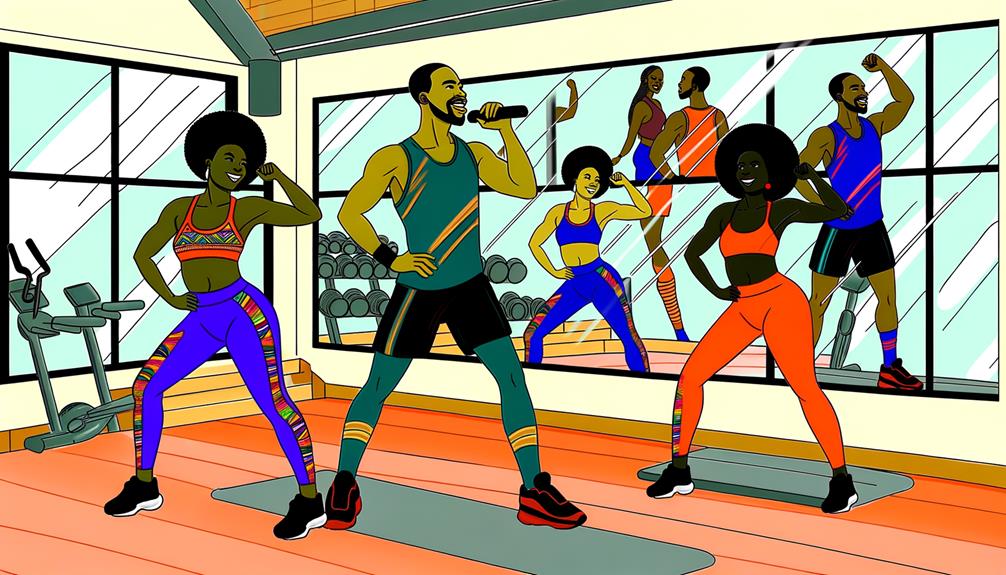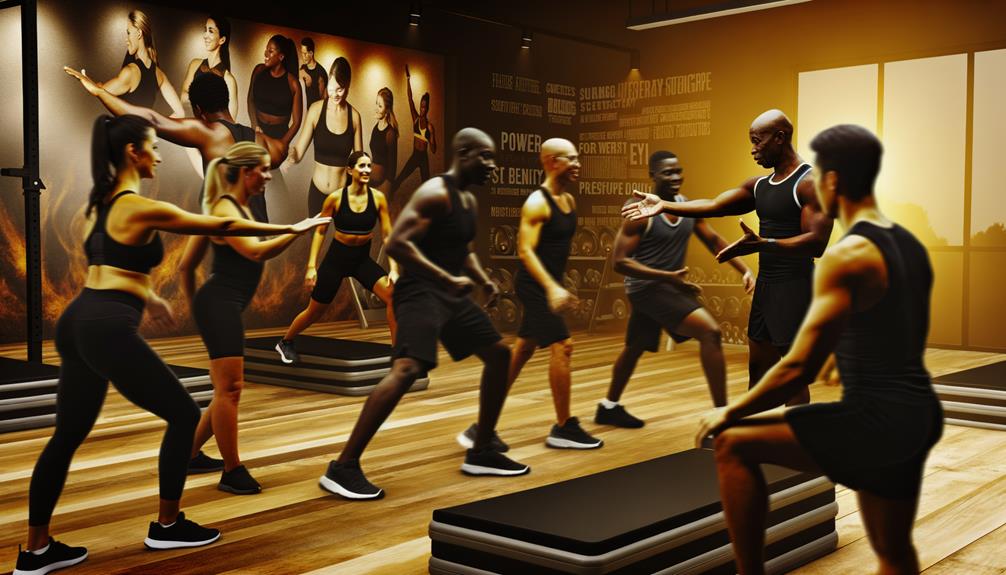You might not have noticed, but Black personal trainers are quietly transforming the wellness landscape, challenging long-held stereotypes and offering a fresh perspective on fitness. Their impact goes beyond physical training, as they integrate cultural nuances and emphasize holistic health and community support. This approach not only inspires personal transformations but also shifts the broader narrative around fitness and representation. So, what's at the heart of this movement, and how are these trainers shaping the future of wellness for everyone? There's more beneath the surface that could redefine how you perceive fitness and inclusivity.
Breaking Stereotypes in Fitness

In the world of fitness, Black personal trainers are challenging long-standing stereotypes with determination and expertise. You see, they're not just trainers but pioneers in dismantling stereotypes and fostering community building.
By offering fitness accessibility to all, they ensure that the gym isn't just a space for the elite but a welcoming environment for everyone. These trainers serve as diverse role models, showing that wellness isn't one-size-fits-all. Their presence challenges cultural misconceptions that have long hindered certain communities from engaging in holistic health practices.
Research indicates that Black trainers are at the forefront of promoting wellness equity. They're actively creating programs that cater to a variety of needs, ensuring that people of all backgrounds can pursue their fitness goals without barriers.
This inclusivity helps bridge the gap, making fitness more approachable and less intimidating for marginalized groups. By breaking down these barriers, they're not only reshaping individual perspectives but also transforming the broader fitness culture.
You'll find that their efforts lead to stronger community ties and improved health outcomes, all while inspiring the next generation to follow in their footsteps and continue this vital work.
Empowering Through Representation
Representation in the fitness industry holds transformative power, especially when Black personal trainers take center stage. By simply being visible, they challenge outdated stereotypes and inspire others who see themselves reflected in positions of expertise and influence.
When you witness a diverse array of role models, it broadens your perception of what's possible. These trainers actively foster community engagement by creating inclusive spaces where everyone feels welcome and understood.
Black personal trainers often employ holistic approaches to fitness, integrating physical, mental, and emotional well-being. They've recognized that wellness isn't just about lifting weights or running miles; it's about nurturing the whole self.
This comprehensive view encourages you to adopt healthier lifestyles that benefit you long-term. Research shows that representation can empower marginalized communities by providing relatable and aspirational figures.
When you see someone who looks like you achieve success in their field, it reinforces the belief that you can too. Black personal trainers aren't just reshaping bodies; they're reshaping narratives.
They bring authenticity and depth to fitness spaces, encouraging you to engage in wellness journeys that honor your unique identity and heritage. This empowerment through representation creates lasting impacts, fostering a more inclusive and healthier society.
Cultural Impact on Wellness

Cultural influences shape the way you approach wellness, affecting everything from dietary choices to preferred exercise routines. Your cultural heritage often dictates traditional foods that nourish your body, while also connecting you to your roots. This connection isn't just about sustenance; it's a form of identity exploration, helping you understand who you're and where you come from.
Community engagement plays a pivotal role in how wellness practices are adopted and maintained. Engaging with your community can introduce you to collective activities, like group fitness classes or community gardens, which foster a sense of belonging and mutual support. Such activities also enable you to share mindfulness practices that promote emotional and physical well-being.
Holistic approaches in wellness take into account the entire spectrum of your being, influenced significantly by historical influences. These influences might involve traditional healing methods passed down through generations, emphasizing balance and unity between mind, body, and spirit.
Ultimately, your wellness journey is deeply personal yet profoundly communal. By acknowledging and incorporating elements of your cultural heritage, you create a wellness practice that's authentic, sustainable, and reflective of the rich tapestry of your identity.
Mental Resilience and Fitness
Understanding your cultural heritage helps shape your approach to wellness, and mental resilience is a vital component of the fitness journey. It's not just about physical strength; mental toughness plays an equally crucial role. Studies suggest that your mindset can significantly influence fitness outcomes. You've got to cultivate emotional strength to push through challenges, whether it's battling fatigue during a workout or staying committed to your goals over time.
Research highlights that mental toughness involves developing a positive outlook and perseverance. When you face setbacks, your ability to recover quickly is crucial. Techniques like visualization, mindfulness, and goal-setting can enhance your mental resilience. Visualization lets you imagine success vividly, fostering motivation. Mindfulness keeps you present, reducing stress and improving focus.
For many Black personal trainers, integrating cultural understanding with these mental strategies enriches the fitness experience. They often share the importance of community support and ancestral wisdom, which can bolster your emotional strength.
Embrace these insights as you embark on your fitness journey—your heritage can be an invaluable source of power. By strengthening both body and mind, you're not just building muscles; you're cultivating a resilient spirit that can thrive amidst adversity.
Success Stories and Inspirations

In recent years, the fitness industry has witnessed an inspiring wave of success stories led by Black personal trainers who are breaking barriers and setting new standards. These trainers aren't just about physical transformations; they're changing lives through client transformations that emphasize holistic wellness.
Their approach often extends beyond the gym, fostering community engagement and building supportive networks that uplift and empower.
You'll find trainers like Jeanette Jenkins and Shaun T, who've achieved remarkable client transformations by integrating personalized workout regimes with mental resilience strategies. Their success stories highlight how they motivate clients to push past their limits while focusing on mental and emotional well-being.
This dual approach leads to sustainable lifestyle changes that go beyond temporary fitness goals.
Community engagement plays a crucial role in their success. By hosting workshops, seminars, and online challenges, these trainers actively involve diverse groups, making fitness accessible to all.
They're not only transforming bodies but also nurturing inclusive spaces where everyone feels valued and motivated.
The stories of these trailblazers serve as a testament to the power of representation, showing how Black personal trainers redefine success in the wellness industry by inspiring and engaging their communities.
Future of Diversity in Wellness
Looking ahead, the momentum sparked by Black personal trainers in the wellness industry lays a promising foundation for the future of diversity in wellness. As these trainers continue to champion inclusive practices, they're not only fostering community engagement but also broadening the scope of fitness to include diverse narratives.
This shift isn't just about representation; it's about ensuring equitable access to wellness resources for everyone, regardless of background. You can see the impact when trainers incorporate cultural competency into their programs, tailoring fitness routines that respect and celebrate different cultures.
This approach resonates with clients who seek wellness experiences that honor their identities. By promoting holistic approaches, Black trainers are redefining wellness beyond physical fitness, encompassing mental, emotional, and social well-being.
Research shows that when wellness programs embody cultural sensitivity and inclusivity, they result in better outcomes for participants. As you engage with these evolving practices, it's crucial to support initiatives that push for diversity at every level of the industry.
Conclusion
In embracing Black personal trainers, you not only challenge fitness stereotypes but also empower yourself through diverse representation. Their unique cultural insights enrich your wellness journey, offering a holistic approach that melds physical training with mental resilience. By supporting these trainers, you're fostering an inclusive fitness community that celebrates diversity and breaks down barriers. As the wellness industry evolves, your commitment to diversity ensures a future where everyone has the opportunity to thrive and inspire.


